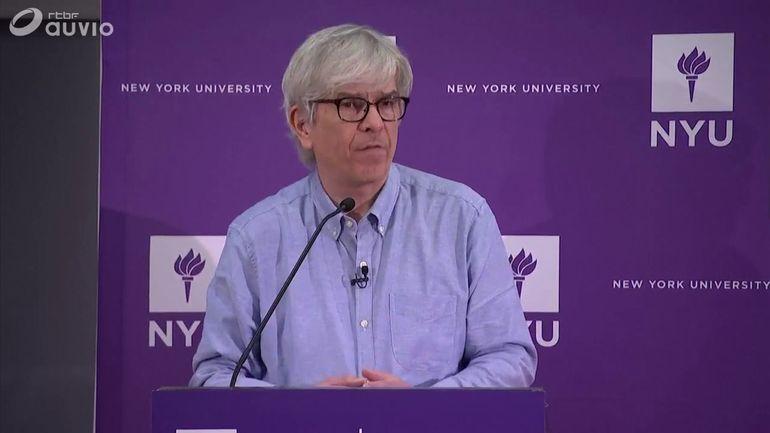Le co-lauréat du prix Nobel d'économie 2018, Paul Romer (en anglais)
| Publié le 09/10/18
RESTRICTION SUMMARY: AP CLIENTS ONLY SHOTLIST: ASSOCIATED PRESS - AP CLIENTS ONLY New York - October 8, 2018 1. Paul Romer enters 2. SOUNDBITE (English) Paul Romer, Winner, Nobel Prize in Economics "So I called back thinking they were trying to do some due diligence or something about, you know, somebody else. And then they asked me if I would accept. And, well, I didn't ever want it, but yeah I'll accept!" 3. Wide of Romer 4. SOUNDBITE (English) Paul Romer, Winner, Nobel Prize in Economics "What kind of a good is an idea? What does it mean to say we produce ideas or we trade ideas? How is that different from corn or steel? And that analysis of the economics of ideas grew into this understanding of why things are speeding up. It involves this more effective teamwork of billions of people all trying to push forward the frontiers of knowledge. And it has practical implications for both globalization and for things like science policy, policy towards how we train the next generation of students." 5. Wide of Romer 6. SOUNDBITE (English) Paul Romer, Winner, Nobel Prize in Economics "Cities make us smart. What it is is cities are the place to go if you want to learn about the modern world. So if you take the billions of people in developing world who can't yet connect into this chance to learn, cities that can welcome them, here I'm going to use the language of my colleague Sully Angel who's been doing this work in Ethiopia and Colombia, for example, as a proof of what is possible: What we need to do is make room for people who want to move into cities. You know, there's billions of people who want to move into cities and people who are already in cities who want to have more space. We've gotta make room for that to take place." 7. Wide of Romer 8. SOUNDBITE (English) Paul Romer, Winner, Nobel Prize in Economics "And I think what's a little bit troubling, even though I remain very optimistic about technological possibilities, is that it seems as though we're starting to lose our commitment to the facts." 9. Wide of Romer 10. SOUNDBITE (English) Paul Romer, Winner, Nobel Prize in Economics "You're entitled to your own opinion, but you're not entitled to your own facts. And this really is the essence of what science can do. People will make different value judgments, they'll have different preferences, different priorities. But what science can do is provide a statement of the facts." 11. Wide of Romer 12. SOUNDBITE (English) Paul Romer, Winner, Nobel Prize in Economics "It's a very important time for us to try and agree and support some process that establishes the facts because this process of better standards of living, better health, better opportunities, more equal opportunities -- so this process all derives from some system which figures out what's true and what's not." 13. Wide of Romer STORYLINE: The Nobel prize in economics was awarded Monday to one American who has studied the economics of climate change — and to another whose research on technological innovation has raised hopes that human beings are creative enough to do something about it. The Royal Swedish Academy of Sciences awarded the $1 million prize to William Nordhaus of Yale University and Paul Romer of New York University. Romer, who has studied why some economies grow faster than others, has produced research that shows how governments can advance innovation. Through his research into cities, Romer contends that governments can foster greater technological advancements and wealth if they invest more in the expansion of urban areas. "Cities make us smart. What it is is cities are the place to go if you want to learn about the modern world," he said. Rom
